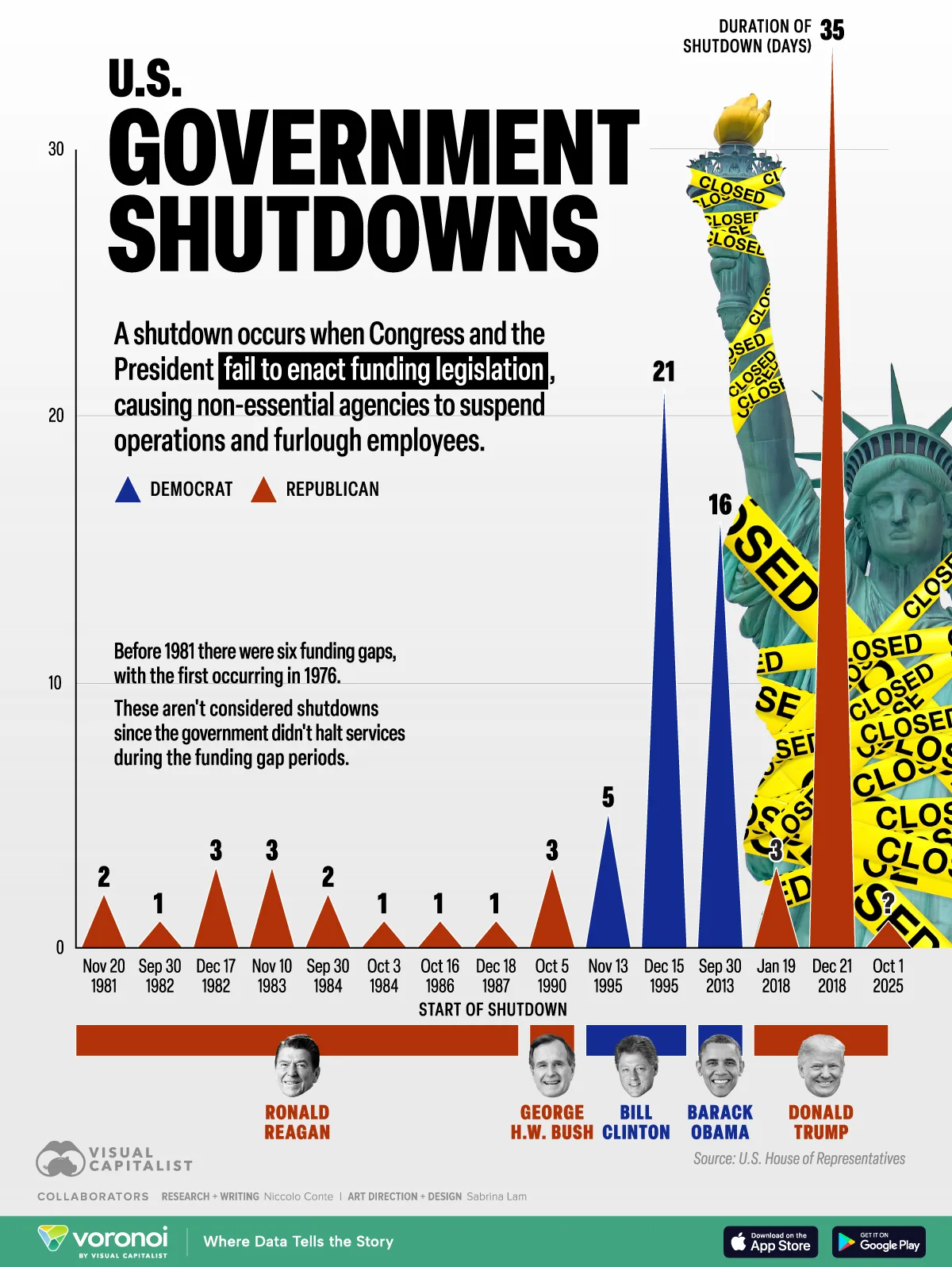![]()
See visuals like this on the Voronoi app.

Use This Visualization
Charted: The History of U.S. Government Shutdowns
See visuals like this from many other data creators on our Voronoi app. Download it for free on iOS or Android and discover incredible data-driven charts from a variety of trusted sources.
Key Takeaways
- The first U.S. government shutdown was in 1981 under President Ronald Reagan, and lasted two days.
- Including the latest shutdown that began on October 1, 2025, there have been 15 U.S. government shutdowns amounting to 97 days of suspended federal operations.
The U.S. entered its 15th government shutdown on October 1, 2025, under President Donald Trump.
This latest lapse in federal funding is part of a decades-long history of shutdowns which began in 1981 with the first shutdown under Ronald Reagan.
This graphic visualizes the history of U.S. government shutdowns using data from the U.S. House of Representatives, including the president during the shutdown and how many days the shutdown lasted.
Every U.S. Government Shutdown’s Duration
A government shutdown happens when Congress fails to pass a funding bill or continuing resolution, preventing parts of the federal government from operating.
Essential services, like national security and mail delivery, continue, but many federal employees are furloughed, and agencies pause regular operations.
The table below shows every U.S. government shutdown’s starting date, duration, and the current U.S. president at the time.
| Start date of U.S. government shutdown | U.S. President | Duration of U.S. government shutdown (days) |
|---|---|---|
| Nov. 20, 1981 | Ronald Reagan | 2 |
| Sept. 30, 1982 | Ronald Reagan | 1 |
| Dec. 17, 1982 | Ronald Reagan | 3 |
| Nov. 10, 1983 | Ronald Reagan | 3 |
| Sept. 30, 1984 | Ronald Reagan | 2 |
| Oct. 3, 1984 | Ronald Reagan | 1 |
| Oct. 16, 1986 | Ronald Reagan | 1 |
| Dec. 18, 1987 | Ronald Reagan | 1 |
| Oct. 5, 1990 | George H.W. Bush | 3 |
| Nov. 13, 1995 | Bill Clinton | 5 |
| Dec. 15, 1995 | Bill Clinton | 21 |
| Sept. 30, 2013 | Barack Obama | 16 |
| Jan. 19, 2018 | Donald Trump | 3 |
| Dec. 21, 2018 | Donald Trump | 35 |
| Oct. 1, 2025 | Donald Trump | - |
The first true shutdown occurred in November 1981 under President Ronald Reagan, lasting just two days. In fact, most early shutdowns of the 1980s were short-lived, often lasting one to three days.
It’s important to note that before 1981, there were six “funding gaps,” beginning in 1976. During those gaps, however, federal services were not halted, so they are not considered shutdowns.
The Longest U.S. Government Shutdowns
While early government shutdowns tended to range from one to three days, more recent shutdowns have stretched far longer.
The longest shutdown in U.S. history took place from December 2018 to January 2019 under President Trump, lasting 35 days. The second-longest shutdown was under President Bill Clinton, lasting 21 days, from mid-December of 1995 into January of 1996.
These two shutdowns make up more than half of the duration of all U.S. government shutdowns, which span 97 days over 15 shutdowns in total.
What Happens During a Government Shutdown
Short shutdowns, like the single-day lapses in the 1980s, create limited disruption.
But longer government shutdowns ripple through the economy, halting research projects and delaying pay for federal employees, all while eroding confidence in government institutions.
The Congressional Budget Office estimates that the 2018/2019 government shutdown under Donald Trump cost the U.S. around $3 billion in permanent GDP losses over two quarters.
With the current shutdown multiple days underway in 2025, Americans will be wondering whether this shutdown will set a new record in duration and costs.
Learn More on the Voronoi App ![]()
To learn more about the cost of U.S. government shutdowns, check out this graphic on the GDP loss and spending delays from the 2018/2019 government shutdown on Voronoi.